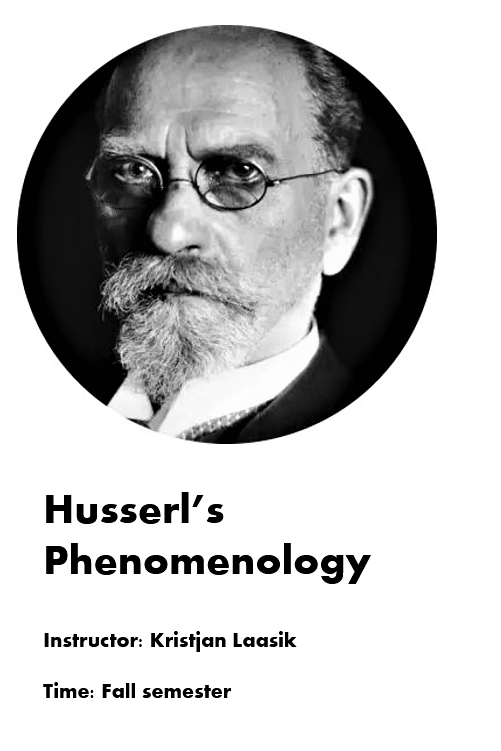Husserl’s Phenomenology
Instructor: Dr. Kristjan Laasik
Time: Fall Semester
Place: Zijingang Campus
Syllabus: Download

This course is an introduction to Edmund Husserl’s phenomenology, or a peculiar kind of study of consciousness and its objects. We cover the main topics with which Edmund Husserl concerned himself during his long philosophical career, which spanned from the last decade of the 1890s till into the 1930s, such as intentionality, the Body, intersubjectivity, and the Lifeworld. We also consider Husserl’s methodology, which involved aspects such as the eidetic and phenomenological reduction and the epoche, and the main stages in the development of Husserl’s thought. Since Husserl is one of the most important and influential philosophers of the 20th century, knowledge of his ideas will be valuable for students of any area of philosophy, and indispensable for the students who wish to develop a focus on 20th century Continental philosophy.
Indian Philosophy and Religion
Instructor: Dr. HORIUCHI Toshio
Time: Fall Semester
Place: West 2-308
Syllabus: Download

This course includes three parts: a) the intellectual history of Indian Brahmanism (orthodox) and its main thought; b) the development of Indian Buddhism and its central idea of each stage, as well as its interaction with Brahmanism; and c) the effect of Indian philosophy and religion to China, Japan, and other East Asian communities. By introducing the basic concepts, history, and philosophical system of Indian philosophy and religion, including Buddhism, as well as by learning primary Sanskrit, this course tries to get students to understand the diversity of Indian philosophy and religion and its essential position in the world map of philosophy.
Critical Reasoning
Instructor: Dr. Kristjan Laasik
Time: Spring Semester
Place: Zijingang Campus
Syllabus: Download

Critical thinking is about how to make and evaluate arguments and explanations, in the context of philosophical debate and otherwise. This course will introduce you to various forms of arguments and explanations, and methods of assessing and criticizing them. By the end of the course, you should be better able to make your own arguments cogently, criticise those of others accurately, and reason clearly.
Philosophical Logic
Instructor: Dr. Bruno Bentzen
Time: TBD.
Place: TBD.
Syllabus: Download

Introduction to the basic concepts of logic and non-classical logic from with emphasis on their philosophical motivation through a study of applications in philosophy.